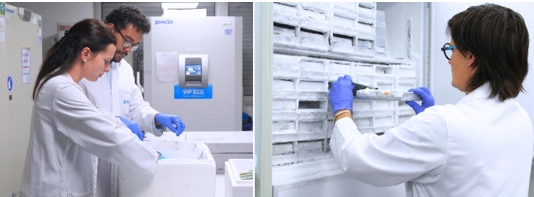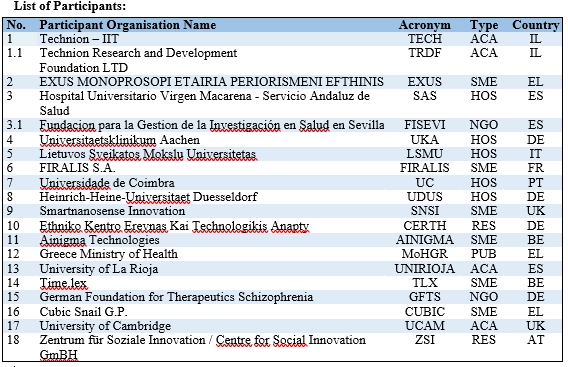Huningue, France – December 2024
On January 1st, 2025, the European Horizon Europe project, VOLABIOS (Validation and Comparative Multi-Omics Benchmarking of Fluid-Derived Volatilomics Biomarkers for the Prevention and Early Detection of Schizophrenia), officially begins its mission to revolutionize the early diagnosis and treatment of schizophrenia. This chronic mental illness affects approximately 1% of the global population—around 80 million people—and ranks among the top 15 causes of global disability, shortening life expectancy by 10-15 years. VOLABIOS aims to introduce advanced, cost-effective diagnostic tools to improve patients' and families' quality of life, reduce diagnostic errors by approximately 30%, and optimize treatment and monitoring strategies.
A Multidisciplinary Approach to Early Diagnosis
VOLABIOS utilizes advanced technologies to transform early schizophrenia diagnosis while striving to uncover the molecular mechanics of the disease. It integrates Multi-Omics approaches—genomics, proteomics, metabolomics, and transcriptomics—to provide a comprehensive understanding of the molecular changes driving schizophrenia. Mobile spectrometry (volatolomics) analyzes volatile organic compounds emitted by the body, offering a non-invasive diagnostic method. Artificial intelligence further enhances this framework by analyzing complex datasets to uncover patterns, correlations, and underlying mechanisms. Together, these technologies enable precise and rapid identification of chemical and biochemical signals serving as biomarkers for schizophrenia, improving diagnostic accuracy, reducing timelines, and paving the way for earlier interventions, deeper disease understanding, and better patient outcomes.
A Global Consortium for Groundbreaking Innovation
The VOLABIOS project brings together a multidisciplinary consortium of 18 partners (+2 affiliated) from 11 European countries, combining expertise in academia, clinical research, technology, public health, and policy-making. United by a commitment to innovation, the team integrates cutting-edge research with practical healthcare applications, developing advanced diagnostic tools and ensuring alignment with public health priorities. An advisory committee of internationally recognized experts in psychiatry and neuroscience provides strategic guidance, ensuring the project stays focused on enhancing early diagnosis and improving patient outcomes. This collaboration equips the VOLABIOS project with the resources and expertise for groundbreaking advancements in mental health diagnostics.
Research Phases and Clinical Impact
The project will progress in multiple stages, starting with a retrospective analysis of 9 million medical records, including 120,000 linked to schizophrenia. Following this, clinical research will involve 3,692 patients from six medical centers across Europe, with individuals being monitored frequently over a period of 18 to 36 months to assess longitudinal changes and validate findings. A blind study involving 1,000 participants will further validate biomarkers and assess their efficacy. The outcomes of VOLABIOS aim to improve global healthcare systems by introducing innovative diagnostic tools, establishing an open-access knowledge base, and supporting future research in diagnosing complex mental disorders.
FIRALIS: Driving Multi-Omics Validation of VOC Biomarkers in VOLABIOS
FIRALIS plays a pivotal role in the VOLABIOS project, bringing its unparalleled expertise in multi-omics technologies and biobanking to validate volatile organic compound (VOC) biomarkers for schizophrenia (SZ). By employing advanced genomics, proteomics, and transcriptomics methodologies, FIRALIS ensures that VOC biomarkers are grounded in robust molecular evidence, supporting the development of transformative tools for early detection, personalized treatment, and effective management of SZ. FIRALIS’s multi-omics approach is a cornerstone of the validation process, ensuring that VOC biomarkers are not only clinically applicable but also deeply rooted in the molecular biology of SZ.
- With genomics, FIRALIS applies targeted sequencing and Polygenic Risk Scores (PRS) to identify genetic variations that influence SZ. This analysis uncovers the genetic predispositions linked to VOC profiles, building a strong foundation for their use in diagnostics. These insights contribute to understanding the hereditary and molecular drivers of SZ, ensuring the credibility of VOC biomarkers in clinical settings.
- With proteomics, FIRALIS employs advanced platforms, including Olink® using its proprietary Proximity Extension Assay (PEA) technology, to investigate protein-level changes. These analyses shed light on key biochemical pathways and molecular mechanisms associated with SZ, further validating VOC biomarkers’ role in reflecting the disease’s biological processes.
- With transcriptomics, FIRALIS leverages high-throughput RNA sequencing to explore gene expression changes linked to SZ. This layer of evidence provides a nuanced understanding of how transcriptional activity contributes to the manifestation of SZ, enhancing the reliability of VOC biomarkers.
By integrating these omics layers, FIRALIS ensures that VOC biomarkers are rigorously validated and supported by comprehensive molecular evidence. This multi-dimensional approach significantly accelerates the transition of VOC biomarkers from experimental tools to clinically robust diagnostics.

Biobanking Excellence: Building a Resource for Long-Term Impact
FIRALIS’s biobank serves as a critical infrastructure for the VOLABIOS project, ensuring the secure and standardized storage of biological samples collected from clinical sites across Europe. By upholding international standards, including ISO 9001, ISO 20387, and ISO 14001, the biobank ensures high-quality sample management that underpins the project’s scientific rigor.
A significant initiative within VOLABIOS is FIRALIS’s effort to establish its biobank as a registered node within the BBMRI-ERIC European biobank infrastructure. This process, undertaken during the project, will position the biobank as a key resource for European mental health research. By integrating into this infrastructure, FIRALIS aims to enhance collaboration across borders, providing researchers with access to high-quality samples for future investigations into SZ and related disorders.
The biobank’s sustainability ensures that the impact of VOLABIOS extends well beyond its duration, creating a lasting resource that supports ongoing advancements in mental health diagnostics and care.

Transforming Schizophrenia Diagnosis and Management
FIRALIS’s contributions to VOLABIOS have profound implications for the diagnosis, treatment, and management of SZ.
By validating VOC biomarkers through a rigorous multi-omics approach, FIRALIS ensures the development of diagnostic tools that enhance early detection, reduce misdiagnosis rates, and enable timely interventions. These advancements improve patient outcomes and alleviate the burden of SZ on healthcare systems. In addition, FIRALIS’s work in molecular stratification enables the classification of SZ into distinct subtypes, facilitating personalized treatment strategies. These tailored approaches improve therapeutic efficacy, minimize side effects, and enhance the quality of life for patients. FIRALIS’s validation efforts also lay the groundwork for integrating VOC biomarkers into routine clinical practice, advancing the standard of care for SZ. The biobank further amplifies these efforts by creating a resource for future research, fostering collaborations, and supporting innovative approaches to precision psychiatry. Through its initiatives, FIRALIS ensures that VOLABIOS contributes to a global effort to address the complexities of SZ and mental health disorders.
Empowering VOLABIOS to Shape the Future of Mental Health Care
FIRALIS’ contributions not only redefine SZ diagnostics but also create a foundation for future breakthroughs in mental health care. FIRALIS’s work empowers VOLABIOS to deliver lasting advancements, improving the lives of patients and setting new standards in precision psychiatry.
![]()
Email : [email protected]

